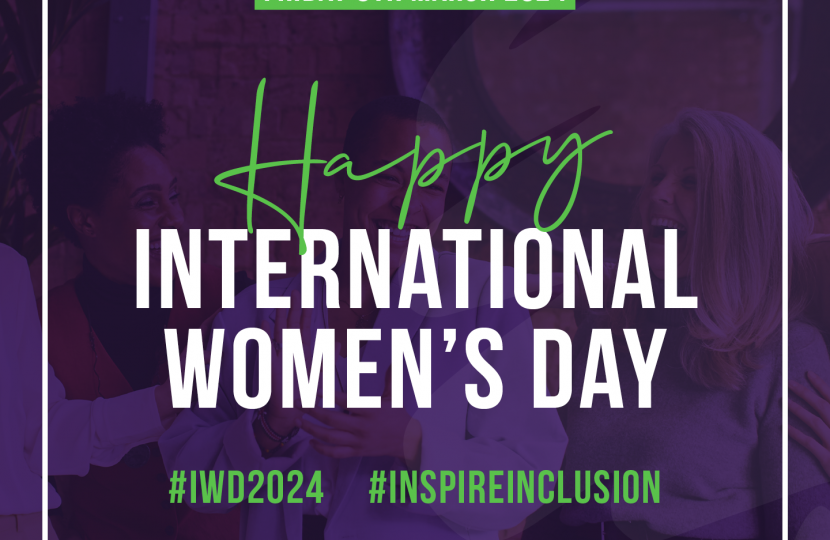
CELEBRATING INTERNATIONAL WOMEN’S DAY
- As Conservatives, we believe in equality of opportunity for all, so everyone across our United Kingdom – no matter their gender, race, or background – can reach their full potential.
- We are champions of women in all aspects of British life, and we are sticking to our plan to support more women to reach the top table of Britain’s biggest companies and politics, strengthen protections for victims of domestic abuse and crack down on perpetrators of violence against women and girls.
- We are committed to gender parity in all aspects of society and will continue to ensure women’s voices are heard as we continue to take decisions for a brighter future for all.
We are removing barriers which hold people back by:
- Acting to see a steep rise in the number of women in work, taking female employment to a record high, meaning more women earning a decent wage. Since 2010, the number of women in employment has increased from 13,616,000 to 16,065,000 at the end of last year.[1]
- Setting out a plan to get more women on our top company boards and delivering on this pledge three years early. We have already met our target to get 40 per cent of FTSE 350 leadership roles held by women, three years early. Women’s board representation increased by nearly three per cent last year across the FTSE 350, with a third of all leadership roles in FTSE companies held by women.[2]
- Introducing thirty hours of free childcare per week for children from 9 months to 4 years, worth £6,500 per year per child from 2025, helping more women return to work after having children. We are expanding free childcare so that working parents will be able to access 30 hours of free childcare per week when their child is 9 months old to when they start school.[3]
We are cracking down on violence against women and girls by:
- For the first time, elevating violence against women and girls to a crime type that policing leaders must treat as a national threat and launching the Tackling Domestic Abuse Plan and the Tackling Violence Against Women and Girls Strategy. In 2022 we committed over £230 million over three years in Tackling Domestic Abuse Plan, complementing our £300 million investment in our 2021 Tackling Violence Against Women and Girls Strategy, supporting victims and survivors.[4]
- Putting £125 million into practical measures like street lighting so that women and girls feel safer at night. Through the Safer Street Fund and Safety of Women at Night Fund, we have invested £125 million to deliver practical support for women and girls across our communities.[5]
- Improving how abhorrent crimes like rape are dealt with so that victims get the support and respect they deserve – including setting up the UK’s first ever government-funded 24/7 support service for victims of rape. The service is operated by Rape Crisis England and Wales who have over three decades’ experience running a helpline for victims.[6]
- Protecting women and girls through our Online Safety Act, delivering on our commitment to better shield people from harmful content online. This Act creates a new base offence of intentionally sharing an intimate image without consent. We are also creating a specific offence of threatening to share intimate image and the sharing of ‘deepfakes’. Cyberflashing is also being made illegal.[7]
We are looking after women’s health by:
- Ensuring women going through the menopause have access to cheaper hormone replacement therapy to help with symptoms, as we stick to the plan we set out in our Women’s Health Strategy in 2022. Since launching on 1 April 2023, more than 500,000 women in England have accessed cheaper HRT helping to save hundreds of pounds in prescription charges.[8]
- Introducing baby loss certificates for parents who experienced a loss of pregnancy before 24 weeks, taking a step towards better supporting women and parents affected. This is a voluntary scheme to allow parents to record and receive a certificate to provide recognition of their loss, delivering on our priorities set out in the Women’s Health Strategy for England.[9]
We are protecting women by:
- Overhauling the laws to protect women from domestic killers, meaning ex-partners who lash out at the end of their relationship will face longer than ever behind bars, protecting vulnerable women. We are introducing longer sentences for partners who murder following the end of a relationship history of coercive and controlling behaviour to be a mitigating factor for abused victims who kill their tormentors.[10]
- Introducing our tough new Domestic Abuse Act, strengthening protections for victims and improve support services. This strengthens protections for victims, reforms family courts to give women support during trials, and ends the so called ‘rough sex’ defence. It also widens the scope of controlling and coercive behaviour, makes non-fatal strangulation a specific criminal offence, and widens ‘revenge porn’ laws.[11]
- Setting out our plan to guarantee single-sex spaces, ensuring women and girls feel safe wherever they are. We are bringing forward changes that will mean all new non-domestic public and private buildings will be required to provide separate single-sex toilets. We are also ensuring that transgender offenders who have committed sexual or violent crimes or retain male genitalia will not serve their sentence in a women’s prison, unless explicitly approved at the highest level.[12]
Conservative women are leading the way:
- We are the only British political party to have elected a female Prime Minister, three times. The Conservative Party is the only political party to be led by three female Prime Ministers and made history when Margaret Thatcher was elected in 1979.[13]
- The last election saw the largest number of female Conservative MPs ever elected to Parliament. In 2019, the number of Conservative female MPs elected to Parliament rose from 67 in 2017 to 87 in 2019 and is now almost double the 49 female Conservative MPs the party had in 2010.[14]
- We voluntarily publish our candidate statistics on gender and ethnic make-up, as we work to improve representation in Parliament. The Conservative Party publishes its Parliamentary Candidate Diversity data on our website, including data on all our parliamentary candidates at the most recent general election.[15]
We publish our gender pay statistics and continue to take steps to review progress on gender diversity to achieve gender equality across our organisation. At CCHQ, our gender pay gap median is 3.8 per cent – significantly below the national average gender pay gap of 8.3 per cent as of 2022.
[1] ONS, Number of women in employment, accessed 19 February 2024, link.
[2] BaT, Press release, 28 February 2023, link.
[3] DfE, Spring Budget 2023 Childcare Expansion, July 2023, link.
[4] UK Parliament, Written Statement, 20 February 2023, link.
[5] HO, News Story, 25 July 2022, link.
[6] MoJ, Press release, 7 December 2022, link.
[7] DSIT, Press Release, 19 September 2023, link; Refuge, News, accessed 28 February 2024, link.
[8] DHSC, Press Release, 24 January 2024, link.
[9] DHSC, Press release, 22 February 2024, link.
[10] MoJ, Press release, 20 July 2023, link.
[11] HO, New Story, 29 April 2021, link.
[12] DLHUC, News story, 13 August 2023, link; MoJ, Press Release, 27 February 2023, link.
[13] GOV.UK, Past Prime Ministers, accessed 28 February 2023, link.
[14] House of Commons Library, General Election 2019: How many women were elected?, 15 January 2020, link.
[15] The Conservative Party, accessed 29 February 2024, link.





